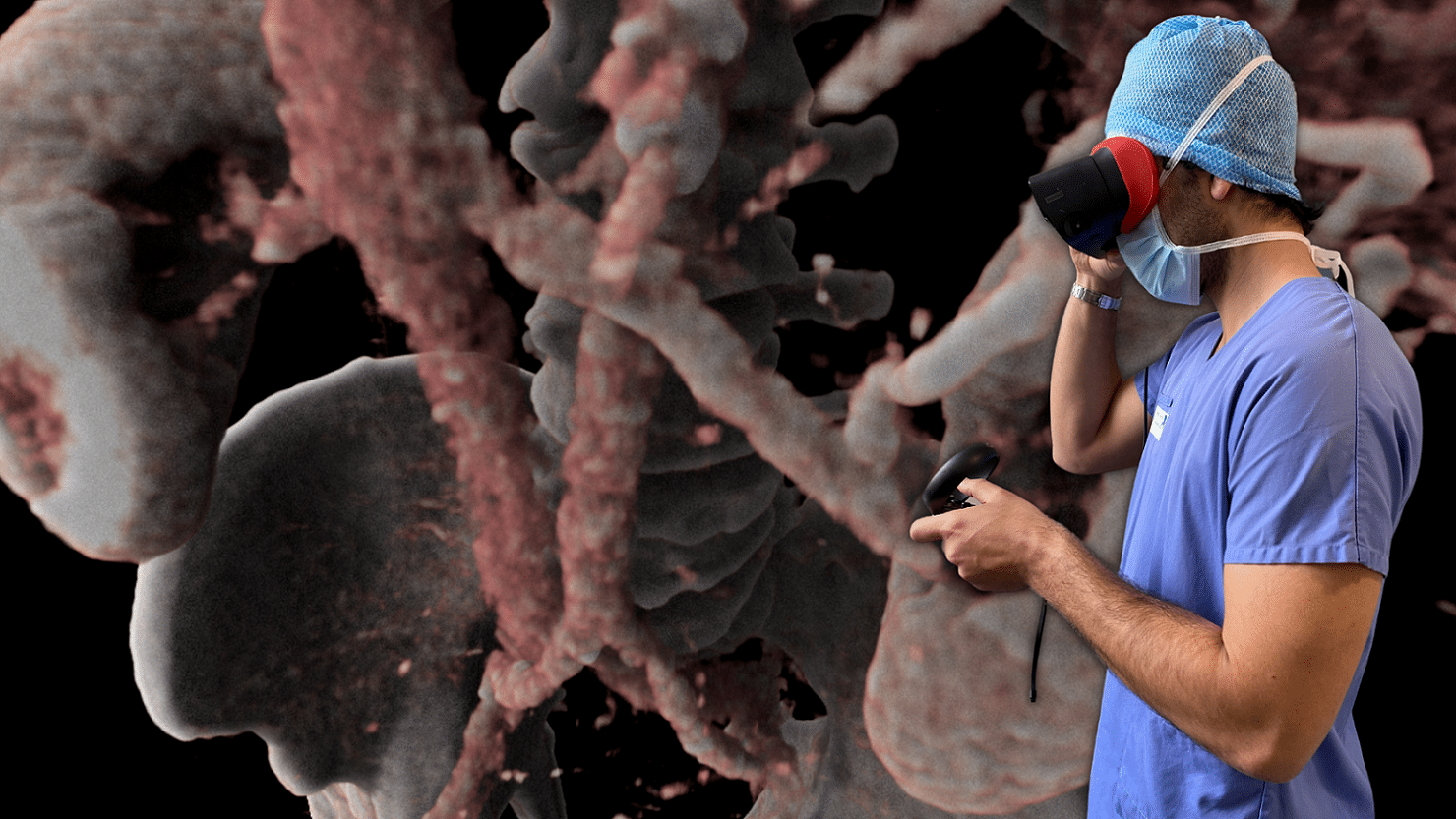Global sales in the virtual reality healthcare market could reach US$40 billion by 2026 (Study by Early Metrics). Extended Reality (XR) brings together three technologies – virtual reality, mixed reality and augmented reality. Revinax, SafeTeam Academy, Avatar Medical and Virtualisurg quickly understood that XR would revolutionize healthcare. Before they launched, these four companies recognized the limits of conventional solutions – traditional continuing education for the first two, and the lack of immersive tools needed to prepare and provide support for surgical procedures for the last two.
Revinax was created in 2015 as a result of the clinical experience of its founder, Dr. Maxime Ros, a pediatric neurosurgeon. When he was a registrar, he noted that traditional surgical training did not allow interns to correctly reproduce the technical procedures they were being taught. They could not see exactly what the teaching surgeon sees while he is operating.
Dr. Ros therefore developed a new way of capturing surgeries in 3D, filmed from the first person point of view, and incorporated them into virtual reality. “This format activates the mirror neurons in the brain, giving learners the illusion that they are performing the surgical procedure themselves,” he said. According to studies that he carried out in France and the USA, the practitioner error rate decreases by 65%; two weeks later, practitioners still remember 90% of the information received (vs. 10% using written media); 88% of users confirm that their nervousness is significantly reduced the first time they put the system into practice.
Furthermore, VR simplifies training procedures and offers greater control over the budget, in this case with content that is “available 24/7 on all media (VR headsets, smartphones, tablets and computers)”. Immersive tutorials are adaptable. Based on their audience, the content and voices are tailored to correspond to the geographic region. In addition to Paris and Toulouse, Revinax also has offices in New York so that it can be close to its clients and the US market.
SafeTeam Academy was also created by two physicians. In 2019, Frédéric Martin and François Jaulin, who are anesthesiologists and healthcare simulation trainers as well as being passionate about safe care, decided to launch an innovative e-learning training platform for healthcare professionals via video-simulation. It is the Netflix of training, with action and management films featuring everyday situations shot from a first person point of view.“These video-simulation training programs mean that games can be used to train caregivers efficiently and in a manner appropriate to their organizational constraints,” they said. These training programs can be rolled out on a massive scale and help improve practices by implementing tools designed to make the care offered more reliable (with checklists, cognitive aids, development of non-technical skills such as decision-making, secure communication and so on). 98% of the personnel signed up complete the training programs. Most content is available in French-speaking and English-speaking countries.
“Never the first time on the patient”
Like its counterparts, Virtualisurg has adopted this famous saying as its credo. Launched in 2017, the startup has developed virtual and mixed reality immersive technologies (digital images that appear in the real world) first for medical training, with surgery following shortly after. Practitioners can perfect their technical skills by carrying out procedures and dealing with potential complications. This represents a financial saving and an alternative to training on animals or cadavers. “Our tool speeds up the sharing of medical skills and knowledge,” said Nicolas Mignan, co-founder and CEO of the company. “It means an eminent professor of surgery in Tokyo can give lessons to 100 people around the world. (…) We combine virtual reality with the real-time use of genuine surgical instruments. This is a world first.” In order to be as close as possible to its partners, the company has, moreover, opened three international subsidiaries (São Paulo, Montreal and Singapore). In 2025, a training module will be offered to patients too, to support them with their rehabilitation via a virtual physiotherapist for example, or with phobia management, addictions or mental illnesses such as schizophrenia.
Virtual reality means that surgical operations can be visualized ahead of time, which is the first step towards personalized medicine. AVATAR MEDICAL, created in 2016 from the interdisciplinary research between academic laboratories and hospitals, is a spin-off from the Institut Pasteur and the Institut Curie. It has designed a software program that aims to improve the way in which surgeons access, interpret and act on clinical information with an innovative viewer for 3D medical images (MRI and CT scans). “Our photorealistic rendering is in real time, with no loss of data, and offers an unparalleled level of visualization of soft tissues for specific surgical specialties,” said Marie Buhot-Launay, co-founder of AVATAR.
For hospitals, the aim is not only to save time and money, but also to improve the efficacy and increase the skills of their surgeons. Patients will benefit from less invasive operations, with less anesthesia, fewer complications and less loss of blood. The AVATAR MEDICAL team is split between France and the USA. The company has just obtained authorization from the FDA for the commercialization of its planning solution, which is to be launched in Europe next year.
XR is constantly evolving, and it is in France’s interest to be at the cutting edge of innovation. The next step is medical metaverses, which are “the future”, according to Nicolas Mignan.“All these virtual environments will be used to train, practice, discuss and exchange ideas (…) but the use of VR in e-health is still not widespread enough,” he lamented. Europe and France are catching up with the United States. “We are still known internationally for our expertise in this field too, and for our high level of development and innovation,” Maxime Ros of Revenax pointed out. The French advocates of XR in healthcare therefore have a number of cards they can play on the international stage, as “the question of medical errors – both human and organizational – is unfortunately a reality for all countries, with no doubt additional difficulties for low-income countries,” said the SafeTeam directors.
15 million virtual headsets were sold around the world in 2022 (Early Metrics). The public is therefore ready. VR is no longer reserved for gamers. It is a tool that is capable of saving lives.







